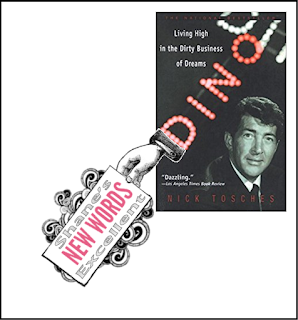NA Confidential often refers to a wetting of beaks.
The concept first came to my attention while reading the best show biz biography ever written, Dino: Living High in the Dirty Business of Dreams, by Nick Tosches.
In 1992, Patrick Goldstein reviewed the book in the Los Angeles Times.
Dino: Living High in the Dirty Business of Dreams
... Perhaps what intrigued Tosches wasn't so much Martin's meager career achievements as the mystery of superstardom itself. What kicks did Dino give 1950s-era America? What enthralled audiences about his easy-going balladry and high jinks with Lewis?
Tosches chalks it up to the emergence of "mob culture," the age of mass entertainment that Henry James foresaw as the coming "reign of mediocrity." Early 20th-Century America spawned nickelodeons, dime novels and cheap music--all prevailing influences on Martin's fans. It was the birth of pop culture, a culture where every common man could be a king, or what passes for royalty today: a celebrity.
"Mob culture" bears an obvious double meaning, but the fact is that Martin tended to keep his distance from the sort of figures his friend Frank Sinatra regularly nuzzled.
Martin's reasoning was borne of experience and his own standoffish personality. To him, these people were interested in nothing except wetting their beaks, and extracting their revenue streams from the pool he was filling.
Consequently, the idiom appears in novels by the likes of Mario Puzo, and television shows on the order of The Sopranos.
Wet My Beak (Urban Dictionary)
To muscle in on someone else's action. To take a piece of the pie.
When Johnny Sack moved to Jersey, he claimed "I'm not looking to wet my beak." But Tony Soprano knew otherwise.
Perhaps a more subtle and appropriate definition is here, as anchored to the verb "partake."
wet (one's) beak
To partake in part of the profits of another person's business, usually as a result of extortion. (Used especially in reference to organized crime, particularly "protection money" paid to the Italian Mafia.)
Trust me, you're better off just giving him what he wants whenever he comes round to wet his beak. If you don't pay up, you'll have bigger problems.
This blog holds that when it comes to a wetting of beaks, the thirsts being slaked are far more commonly attached to perfectly upstanding citizens (in appearance), who operate according to perfectly legal mechanisms instituted precisely to facilitate a wetting of beaks. It doesn't rule out extortion, but it accepts a level of built-in remuneration not always obvious to Joe Sixpack.
As a particularly relevant and oddly piquant example, consider this.
Lawyers get fat on bond 'crumbs' worth hundreds of thousands of dollars (The Augusta Chronicle)
Like angels getting wings every time a bell rings, board attorneys reap big bucks every time governments in Augusta and Columbia County issue debt.
Think of it as a bell that goes cha-ching.
Attorneys for commissions and school systems normally charge hourly rates to sit in on meetings, review contracts and handle litigation. But when their boards issue multimillion-dollar revenue and general obligation bonds, they become what's called the issuer's counsel, taking a flat fee.
Based on responses to open records requests sent to several lawyers in the area, a government attorney on a Richmond or Columbia county bond deal will make roughly a quarter of one percent, or 0.25 percent, of the bond amount. Those crumbs from the pie can translate to hundreds of thousands of dollars.
It means that when Augusta-Richmond County issued a $160 million bond to expand the water and sewer system in 2004, city attorney and former commissioner Steve Shepard's law firm earned $400,000. When Augusta issued a $149 million water and sewer bond in 2002, his predecessor, Jim Wall, made $348,500.
When the Richmond County Board of Education, after voter approval of a special purpose local option sales tax, issued a $115 million bond in 2002 to build new schools and stadiums and buy new buses, school board attorney Pete Fletcher's firm made $325,000.
In Columbia County, when the commission issued a $28.9 million water and sewer bond last year, Doug Batchelor earned $71,290 in fees for Hull Towill Norman Barrett & Salley.
Bond fees are negotiable but are seldom negotiated, and many elected officials admittedly know little about them ...











No comments:
Post a Comment